Daily, Weekly & Long-Term Tips for Granite, Quartz, Marble, Porcelain & More
Your countertops are the most-used—and often most abused—surface in the kitchen. From sizzling pots to spilled sauces, they take the brunt of your daily cooking routine. Whether you’ve invested in stunning natural stone or sleek engineered surfaces, proper care and maintenance can protect your countertop’s beauty and performance for years to come.
This comprehensive care guide walks you through the best practices for each major countertop material we work with, including quartz, granite, marble, quartzite, soapstone, and porcelain—plus general tips that apply to any surface.
General Daily Care for All Surfaces
No matter what your countertop is made of, these universal rules will help keep it clean and damage-free.
Do:
- Wipe daily with mild dish soap and warm water
- Use cutting boards and hot pads or trivets
- Clean up acidic spills (like lemon juice or wine) immediately
- Dry surfaces after cleaning to prevent streaks or water spots
Don’t:
- Use bleach, ammonia, or harsh chemical cleaners
- Leave standing water, oils, or sauces to soak
- Use scouring pads or abrasive scrubs on any surface
- Assume “stone” means zero maintenance
Pro Tip: A soft microfiber cloth is ideal for daily cleaning—gentle, absorbent, and non-abrasive.
How to Clean and Maintain Specific Countertop Materials
Each material has its own care needs. Here’s how to keep your countertops looking their best—short-term and long-term.
Quartz (Engineered Stone)
- Daily Care: Mild soap + water or non-abrasive cleaner (e.g., Method or Weiman Quartz Cleaners)
- Deep Cleaning: Use a pH-neutral stone-safe product
- Avoid: Harsh chemicals, high heat, abrasive pads
Why it works: Quartz is non-porous and incredibly durable—but prolonged exposure to heat or strong chemicals can dull the surface.
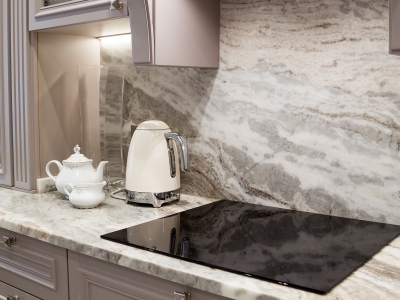
Granite (Natural Stone)
- Daily Care: Granite-safe cleaner or mild soap and water
- Deep Cleaning: 1:1 mix of isopropyl alcohol and water (optional)
- Maintenance: Reseal every 1–2 years depending on usage
- Avoid: Vinegar, lemon juice, or bleach—these can degrade the sealant
Sealing Tip: Sprinkle water on the surface. If it darkens after 5–10 minutes, it’s time to reseal.
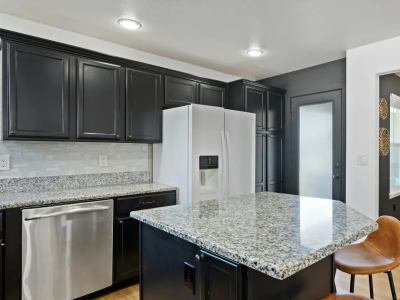
Marble
- Daily Care: Damp cloth + pH-neutral stone cleaner
- Stain Removal: Baking soda paste (for oils) or hydrogen peroxide (for organics)
- Maintenance: Seal every 6–12 months
- Avoid: Acidic or abrasive products—they cause etching and dull spots
Note: Even sealed marble can stain or etch. It’s best reserved for low-traffic areas or used with care.
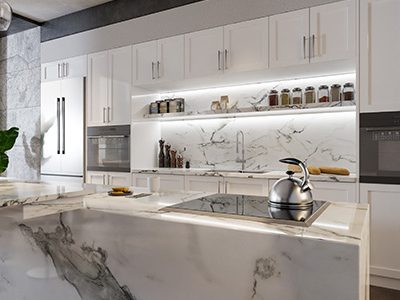
Quartzite
- Daily Care: Warm water and pH-balanced stone cleaner
- Maintenance: Seal every 12–18 months
- Avoid: Abrasive cleaners, high-acid substances
Why quartzite? It offers the look of marble but with better durability and heat resistance—a great natural alternative to quartz.
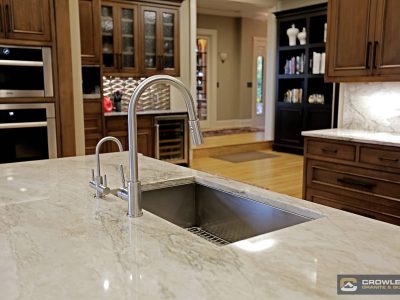
Soapstone
- Daily Care: Soft sponge + gentle soap and water
- Monthly: Wipe with food-safe mineral oil to even out natural patina
- Avoid: Harsh scrubbers or letting water pool on the surface
Good to Know: Soapstone doesn’t need sealing. It’s naturally non-porous and resistant to acid—but it scratches more easily than other stones.
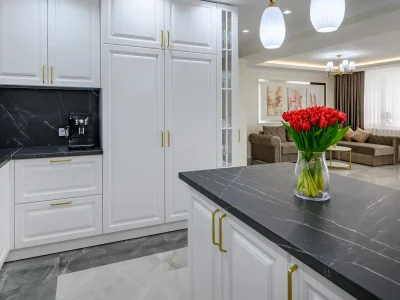
Porcelain Slabs
- Daily Care: Use mild all-purpose cleaner or dish soap + water
- Deep Cleaning: Any non-abrasive cleaner safe for ceramic or tile
- Avoid: Metal scouring pads (especially near edges)
Why it’s trending: Porcelain is UV-stable, heat-resistant, and requires virtually no sealing or maintenance—perfect for sleek, modern kitchens and indoor-outdoor continuity.
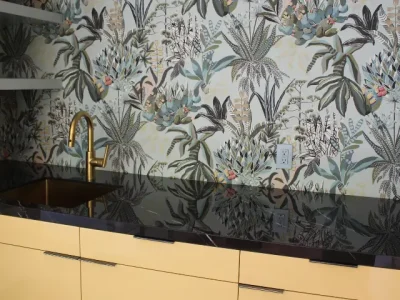
How to Seal Natural Stone Countertops
If your surface is porous (like granite, marble, or quartzite), sealing is critical to protect against stains and etching.
Step-by-Step Sealing:
- Clean thoroughly and let surface dry completely
- Apply stone sealer evenly with a microfiber cloth
- Let it sit for 15–20 minutes (follow product instructions)
- Buff away excess with a clean, dry cloth
- Reapply if needed, then allow to cure
Frequency:
- Marble: Every 6–12 months
- Granite & Quartzite: Every 1–2 years
- Soapstone & Quartz: Do not seal
Countertop Care: Quick Do’s and Don’ts
| Do | Don’t |
|---|---|
| Use trivets for hot pots and pans | Put hot cookware directly on quartz or marble |
| Wipe spills quickly, especially acidic ones | Let wine, vinegar, or oil sit on the surface |
| Use pH-neutral cleaners | Use bleach, ammonia, or vinegar-based products |
| Reseal natural stone as needed | Assume a countertop is “maintenance-free” forever |
| Dry surfaces after cleaning | Leave damp towels or cloths on wood or stone |
Final Takeaway
Your countertops are the hardest-working surfaces in your kitchen. Give them the right care—tailored to the material—and they’ll reward you with decades of durability and style. From simple daily wipe-downs to occasional sealing, a little maintenance goes a long way.
Need product-specific care tips or help sealing your stone surfaces?
Frequently Asked Questions
Granite and quartzite should be sealed every 1–2 years; marble every 6–12 months. Quartz and porcelain don’t require sealing.
Only on non-porous materials like quartz and porcelain. Avoid them on granite or marble, as they may break down the sealant.
Warm water, a drop of dish soap, and a microfiber cloth work well for nearly all surfaces.
That’s likely etching from acid exposure. You may need a marble polishing powder or professional resurfacing.
